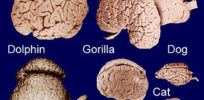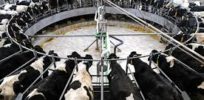National Geographic
Microbes, more than diet, responsible for one type of malnutrition
Malnutrition seems like an intuitive problem: you don’t eat enough food, so your health suffers. But it’s not that simple ...
Wrong kind of gut microbes could cause malnutrition
Malnutrition seems like an intuitive problem: you don’t eat enough food, so your health suffers. But it’s not that simple ...
Why people become skeptics of GMOs, vaccines and climate change
We live in an age when all manner of scientific knowledge—from the safety of fluoride and vaccines to the reality ...
Airborne form of Ebola a realistic possibility?
Back in September, when the West African Ebola outbreak was getting worse with every passing week, a lot of people ...
Understanding the UCLA superbug problem
The UCLA Health System announced earlier this week that seven patients—two of whom died—became infected by highly drug-resistant bacteria that ...

Only a few genes separate human and animal intelligence
Some parts of our genome have evolved at particularly high speed, quickly accumulating mutations that distinguish them from their counterparts ...
How do viruses become contagious?
Here are two recent stories about viruses. They started out alike, and ended up very differently. In October, a woman ...
How viruses insert themselves into our DNA
Each year, billions of people get infected with viruses–with common ones like influenza and cold viruses, and rarer ones like ...
Modern genetics (not necessarily GMOs) can help spur next Green Revolution
The green revolution transformed global agriculture. Through selective breeding, Norman Borlaug, an American biologist, created a dwarf variety of wheat ...
Why did most mammals stop laying eggs?
About a decade ago, Vincent Lynch emailed Frank Grutzner to ask for a tissue sample from a pregnant platypus. He ...
Why ‘unnatural’ life probably doesn’t deserve the reputation of Frankenstein
In the standard Frankenstein story, a scientist creates an unnatural monster that breaks out of the lab and runs amok ...
What if your microbiome turns against you?
It’s an ugly fact of life that getting old means getting infections. Old people get attacked more by pathogens, and ...
New antibiotic thwarts bacterial resistance
The British chemist Lesley Orgel had a rule: Evolution is cleverer than you. Antibiotic-resistant bacteria have repeatedly proven him right. Since ...
Why we see faces in inanimate objects
Most people are obsessed with faces. We see faces everywhere, even in things that are most definitely not faces. The most ...
Why don’t indigenous Americans look like their pioneer ancestors?
The first face of the first Americans belongs to an unlucky teenage girl who fell to her death in a ...
Immune system hoards iron supply to fight microbes
Disease is an act of piracy. When microbes infect us, they steal our resources so they can thrive at our ...
After education on GMOs, ‘idea became less scary’
A few weekends ago I made the four-hour drive from my hometown of Madison, Wisconsin to Northfield, Minnesota to visit ...
Dangers of exaggerating premature scientific findings
In 2011, Petroc Sumner of Cardiff University and his colleagues published a brain imaging study with a provocative result: Healthy men ...
Autism research plagued by major flaw
I’ve written a lot of stories about autism research, and I’d say one of the biggest scientific developments in the ...
Animals steal antibiotic genes from microbes
Life on this planet has existed for at least 3.5 billion years. For most of that time, it was microscopic ...
Newly discovered ancient mammal had some surprising traits
Mesozoic mammals were fascinating little beasts. They burrowed, climbed, glided, and swam through the Age of Dinosaurs, not as underdogs ...
Only birds evolved feathers, but many other species have genes for them, too
Feathers are like eyes or hands. They’re so complex, so impressive in their adaptations, so good at getting a job ...
Is a dead body a person?
On the night of July 19, 1916, halfway through the First World War, troops from Australia and Great Britain attacked ...
When does personhood begin?
I went to a Catholic high school, where I was taught in religion class that life begins at conception. I ...
Contamination of DNA samples by microbes confounds
You’ve got a group of people with a mysterious disease, and you suspect that some microbe might be responsible. You ...
Little-known microbe may profoundly effect our guts
The twisting helices of DNA within our bodies influence everything from our height to our personality to risk of diseases ...

GMO milk? An enviros dream innovation that most enviros oppose
Like the creators of in vitro burgers, the scientists behind yeast-culture dairy are concerned about animal welfare and agricultural sustainability—but ...
How evolution gave rise to zombie ladybugs and mind-controlling wasps
A predator protected from other predators, the ladybug would seem to have the perfect insect life—were it not for wasps ...

